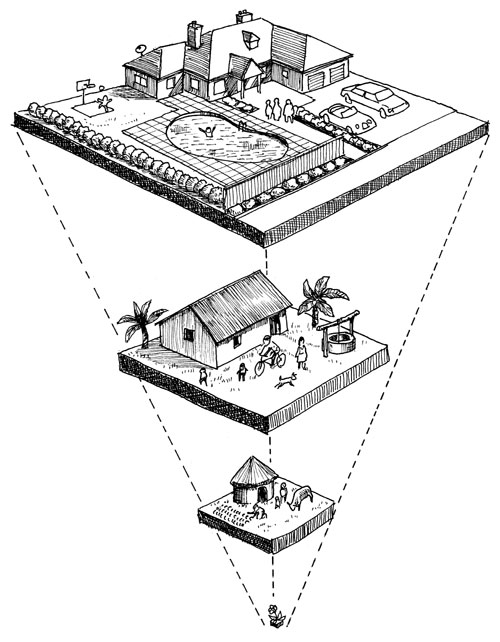O'Connor analyses Lomborg's latest on ecological footprints
Original illustration from http://www.cycleoflife.ca/kids/education.htm
Mark O'Connor writes, "Bjorn Lomborg's arguments seem to be growing sillier and more desperate. Here he responds to Lomborg's statements on the concept of the "ecological footprint" in The Australian 15 April 2009.
Lomborg writes,"The message has been received loud and clear. We are using up too much of the planet's area. But wait a minute. How can we do that? How can we actually use more area than there is on Earth?"
O'Connor: He seems not to understand how we can over-use the Earth, e.g. by harvesting fish or timber at unsustainable rates.
Lomborg writes, "Obviously, any measure that tries to aggregate many different aspects of human behaviour will have to simplify the inputs; the ecological footprint is no different."
[O'Connor: That is true, but is not the explanation of how humanity can be said to be currently using more than one Earth's worth of resources.]
Lomborg writes, "For example, when we talk about American lifestyles needing five planets", [i.e. if everyone today was living at an American lifestyle -- a hypothetical but telling calculation] "we assume that technology is frozen," [O'Connor: Another muddle. Current use is current use, and can't be changed by hypothesizing future improvements in technology. If the statement refers to current rate of use of resources, it is correct.]
Quote from Lomborg continues: "whereas it is likely that worldwide land-use productivity will increase dramatically."
[O'Connor: Rubbish. Agricultural productivity is not in fact rising, and will probably drop heavily as oil and hence fertilisers become much more expensive. This is Colin Clark's old fallacy -- refuted on p. 149 of Overloading Australia )
Lomborg writes, "Likewise, organic farming leaves a larger footprint than its conventional cousin." [O'Connor: "Likewise" has no logical meaning here. There is little organic (= fertiliser-free) farming left, since even third world farmers now use fertilisers heavily. Hence no great savings in acreage to be made there.]
Lomborg continues, "Yet, despite such shortcomings, it is clear that areas we use for roads cannot be used for growing food and that areas we use to build our houses take away from forests."[O'Connor: Now he's changing the subject, sounding reasonable as he concedes something undeniable but irrelevant.]
Lomborg writes, "This part of the ecological footprint is a convenient measure of our literal footprint on Earth."
[O'Connor: Rubbish. Ecological footprint refers to acreage of fertile land needed to produce a human's wants. Land for houses and roads would be a small part of that per capita allotment, not the only "convenient measure of our literal footprint on Earth", as he disingenuously claims.]
Lomborg: "Here",
[O'Connor: i.e. on roads and in houses??? -- but if so the continuation of the sentence makes no sense]
Lomborg: "we live far inside the available area, using about 60per cent of the world's available space"
[O'Connor: Not true if speaking of ecological footprint. Conversely 60% is far too high a figure if he is speaking only of land used for roads and houses. Either Lomborg is totally confused by now, or he hopes his reader is.] ,
Lomborg continues, "and this proportion is likely to drop, because the rate at which the world's population is increasing is now slowing, while technological progress continues."
[O'Connor: Rubbish again. A slow-down in the rate of population growth does not mean a reduction in population; and there is no sign of a reduction in our per capita demands, while technology often increases both the range of products sought and the efficiency with which the environment is destroyed.]
Lomborg: "So no ecological collapse here."
[O'Connor: Even if there were a potentially valid argument here, no such sweeping conclusion could be made from such a back-of-the-envelope calculation. Indeed it's not even that, since no figures (or evidence) have been cited.]
Lomborg writes, "There is just one factor that keeps increasing: our carbon emissions."
[O'Connor: Rubbish again. Australia's detailed State of the Environment reports establish that almost all major environmental indicators are in decline, not just CO2 emissions. The same can be shown for most countries that monitor the issues.]
O'Connor concludes, "The same muddle-headedness runs through the entire article. Lomborg reminds me of a concussed boxer who can no longer see his opponent but hopes that if he stays in the ring and keeps swinging he may be thought competitive."


Recent comments